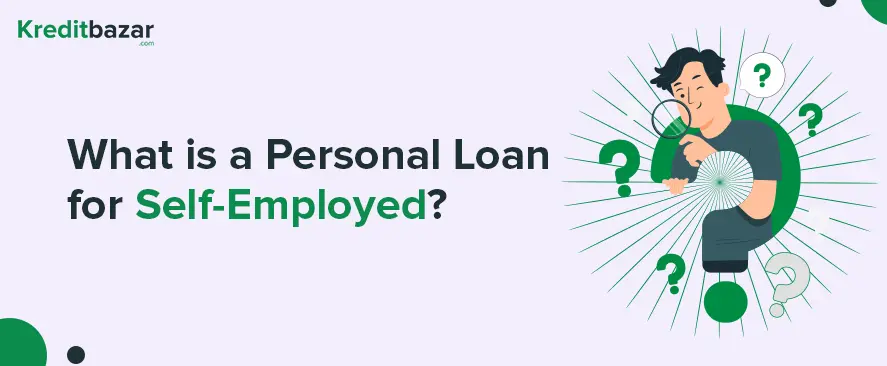![]()
India is home to millions of self-employed individuals who play a critical role in driving the country’s economy. From small-scale entrepreneurs and freelancers to skilled professionals, self-employment has emerged as a popular choice for those looking to be their boss. Whether it’s running a small business, providing professional services, or freelancing across various industries, self-employed individuals contribute significantly to the workforce.
However, being self-employed comes with its own set of financial challenges. Unlike salaried employees, self-employed individuals do not have the luxury of a fixed monthly income. Their earnings are often unpredictable, fluctuating based on market demand, client payments, and other external factors. This irregular income flow can sometimes make it difficult to manage personal and professional expenses, leading to a need for external financial support.
This is where personal loans for self-employed individuals come into play. These loans can be a lifeline for those who need quick access to funds for various purposes, such as business expansion, meeting short-term working capital needs, or covering personal expenses like medical emergencies, home renovations, or even vacations. The flexibility of personal loans makes them an attractive option for self-employed individuals.
The purpose of this blog is to provide a comprehensive guide on personal loans for self-employed individuals in India. We will explore how these loans work, the key differences between loans for self-employed and salaried individuals, and the common reasons why self-employed professionals opt for personal loans.
Table of Contents
What is a Personal Loan for Self-Employed?
A personal loan for self-employed is a type of unsecured loan specifically designed for individuals who do not have a regular salaried income but earn through their businesses or professions. Unlike traditional personal loans that are typically offered to salaried employees with a stable monthly income, personal loans for self-employed individuals are customized to suit the unique financial circumstances of entrepreneurs, freelancers, consultants, and other self-employed professionals.
These loans offer a significant advantage in that they do not require collateral. This means that self-employed borrowers do not need to pledge any assets, such as property or gold, to secure the loan. This makes personal loans more accessible to those who may not have significant assets but need quick funding.
How is a Personal Loan for Self-Employed Different from a Regular Personal Loan?
While the basic premise of both loans remains the same (unsecured loans for personal or business use), there are notable differences in how lenders assess personal loans for self-employed individuals compared to salaried employees. The main distinctions include:
- Documentation: For salaried individuals, lenders usually require income proof in the form of salary slips and bank statements. However, for the self-employed, the documentation process is more detailed. Lenders often ask for income tax returns (ITR) for the last 2-3 years, bank statements, and financial documents related to the applicant’s business, such as profit and loss statements. This is because self-employed individuals do not have a fixed monthly salary, and their income can be irregular.
- Eligibility Criteria: Since self-employed individuals do not have the predictability of a monthly paycheck, lenders are more cautious when approving loans for this category. To qualify for a personal loan for self-employed, applicants may need to demonstrate a stable business history, typically requiring a minimum of 2-3 years of business operations. The lender may also assess the nature of the business, its profitability, and the industry it operates in.
- Interest Rates: The interest rates for personal loans for self-employed individuals may be slightly higher compared to salaried employees. This is because lenders perceive self-employed applicants as higher risk due to the variability in their income. The exact interest rate will depend on factors like the borrower’s credit score, the stability of their income, and the lender’s internal policies.
Common Reasons Self-Employed Individuals Opt for Personal Loans
There are various reasons why self-employed individuals seek personal loans. Some of the most common include:
- Business Expansion: For many self-employed professionals, growing their business is a key priority. Whether it’s opening a new branch, purchasing new equipment, or expanding their product line, a personal loan can provide the necessary capital for business growth.
- Working Capital: Managing day-to-day expenses like inventory purchase, payroll, and operational costs can be challenging, especially during periods of low cash flow. A personal loan helps bridge this gap, ensuring that the business continues to run smoothly.
- Personal Expenses: Like anyone else, self-employed individuals have personal financial needs as well. These could include home renovations, medical emergencies, educational expenses, or even funding a wedding. Since personal loans do not require any collateral, they offer quick access to funds for such purposes.
- Debt Consolidation: If a self-employed individual has multiple high-interest debts, they can opt for a personal loan to consolidate these debts into one, more manageable loan. This can help in reducing the overall interest burden and simplifying the repayment process.
Key Features of a Personal Loan for Self-Employed
1. Unsecured Loan: No Collateral Required
One of the most appealing aspects of a personal loan for self-employed individuals is that it is unsecured. This means that borrowers are not required to pledge any form of collateral, such as property or assets, to secure the loan. This makes the loan more accessible to those who may not have significant assets but need funds for personal or business use. For self-employed individuals, who may face difficulties obtaining secured loans, this feature provides a vital financial lifeline.
2. Flexible Loan Amounts
Lenders offer a wide range of loan amounts depending on the borrower’s needs and eligibility. Whether you need a smaller loan for immediate personal expenses or a larger loan to expand your business, personal loans for self-employed individuals provide flexible loan amounts. These amounts can range from ₹50,000 to ₹25 lakhs or more, depending on the lender’s policies and the borrower’s financial standing.
3. Interest Rates for Self-Employed Individuals
Interest rates on personal loans for self-employed individuals tend to vary depending on several factors, including the borrower’s credit score, income stability, and business profitability. Typically, these interest rates range between 10% to 24% per annum. Self-employed individuals with a strong financial track record, high credit score, and stable income may secure lower interest rates, while those with a more irregular income or lower credit score may face higher rates.
4. Flexible Tenure Options
One of the key features of personal loans for self-employed individuals is the flexibility in repayment tenure. Lenders typically offer a range of tenure options, allowing borrowers to choose a repayment period that suits their financial situation. Loan tenures can range from 12 months to 60 months, giving borrowers the option to opt for either short-term or long-term repayment based on their cash flow and repayment capacity.
5. Quick Disbursal
In comparison to other loan types, personal loans for self-employed individuals often come with faster disbursal times. Many lenders process and disburse the loan amount within 24 to 48 hours of approval, making it an excellent choice for those in need of urgent financial support. The fast disbursal, combined with minimal documentation requirements, ensures that borrowers can access funds swiftly when they need them the most.
6. Minimal Documentation
While self-employed individuals may require more documentation than salaried employees, personal loans for self-employed still come with relatively minimal paperwork compared to secured loans. Most lenders will ask for income tax returns (ITR) of the past 2-3 years, bank statements, and identity and address proof. The documentation is designed to verify the borrower’s ability to repay the loan while ensuring that the process remains hassle-free.
7. Customizable Repayment Schedules
Unlike salaried individuals who may have fixed monthly income, self-employed professionals may experience fluctuating cash flow. To accommodate this, many lenders offer customizable repayment schedules, allowing borrowers to tailor their EMIs based on their income patterns. This flexibility ensures that borrowers can manage their repayments comfortably, without causing undue financial strain.
Eligibility Criteria for the Self-Employed Personal Loan
The eligibility criteria for a personal loan for self-employed individuals can vary depending on the lender, but some common requirements are listed below:
| Criteria | Notes |
| Age | At least 22 years and not more than 65 years. |
| Minimum Annual Income | Rs. 4.8 Lakhs per annum. |
| Work Experience | A minimum of 4 years of work experience post qualification. |
| Minimum Turnover | – Minimum Rs. 40 Lakhs for self-employed non-professionals. |
| – Minimum Rs. 15 Lakhs for self-employed professionals. | |
| Age of the Business | At least 5 years in business (can be relaxed for doctors). |
| Other Conditions | – Self-employed professionals must have a minimum profit after tax payment of Rs. 2 Lakhs. |
| – Some lenders may require applicants to have an existing relationship with them before applying. |
Note: The eligibility criteria may vary across lenders.
Documents Required for Self-Employed Loans
When applying for a personal loan for self-employed individuals, you will generally need to provide the following documents. However, the required documents may vary depending on the lender:
| Document Type | Details |
| Identity Proof | Any one of the following: Driving license, Passport, Voter’s ID, PAN card. |
| Address Proof | Any one of the following: Utility bills, Ration card, License and leave agreement, Passport, Sales tax certificate. |
| Bank Statements | Current account bank statements for the last 6 months. |
| Qualification Proof | Highest professional degree certificate. |
| Income Tax Returns | ITR of the last 2 years with income computation. |
| Profession Continuity Proof | Proof of professional continuity. |
| Age Proof | Age proof document (e.g., birth certificate, Aadhaar card, etc.). |
| Office Address Proof | Proof of the applicant’s office address (e.g., rent agreement, utility bills, etc.). |
Note: The list of documents may vary depending on the lender.
How to Apply for a Personal Loan as a Self-Employed Individual
1. Step 1: Research and Compare Lenders (Banks and NBFCs)
The first step in applying for a personal loan for self-employed individuals is to research various lenders. Both banks and non-banking financial companies (NBFCs) offer personal loans, but the terms, interest rates, and eligibility criteria may vary. By comparing lenders, you can identify which ones provide the most competitive rates and are more lenient towards self-employed individuals. It’s essential to check factors like interest rates, processing fees, loan tenure, and customer reviews to make an informed decision.
2. Step 2: Check Eligibility Criteria and Gather Required Documents
Before proceeding with a loan application, ensure that you meet the lender’s eligibility criteria for self-employed individuals. This typically includes age limits, business vintage, credit score, and income requirements. After confirming your eligibility, start gathering the required documents, such as identity proof, address proof, income tax returns (ITR) for the past 2-3 years, bank statements, and business registration documents if applicable.
3. Step 3: Choose the Loan Amount and Tenure Based on Financial Needs
Once you’ve shortlisted potential lenders, determine the loan amount and tenure that align with your financial needs and repayment capacity. Opt for a loan amount that covers your expenses without overburdening your finances. Similarly, choose a tenure that balances monthly EMI affordability with the total interest payable. Shorter tenures mean higher EMIs but less interest, whereas longer tenures result in lower EMIs but more interest over time.
4. Step 4: Submit the Online or Offline Application Form
Most lenders offer both online and offline application options for self-employed individuals. If you prefer convenience and faster processing, an online application is the best route. You can visit the lender’s website, fill in the required details, and upload scanned copies of the necessary documents. Alternatively, you can visit the lender’s branch for an offline application. Be sure to double-check all information before submission to avoid delays in processing.
5. Step 5: Complete Verification and Await Loan Approval and Disbursal
After submitting your loan application, the lender will conduct a thorough verification process. This includes checking your credit score, financial history, income stability, and submitted documents. If all requirements are met, the lender will approve your loan, and you’ll receive the disbursed amount within a few days, often within 24-48 hours for online applications. Stay available during this period, as the lender may request additional information or clarification.
Factors Affecting Personal Loan Approval for Self-Employed
1. Credit Score
Your credit score is one of the most critical factors influencing the approval of a personal loan for self-employed individuals. Lenders rely heavily on credit scores to assess a borrower’s creditworthiness. A score above 700 is considered favourable and increases your chances of getting approved with lower interest rates. Conversely, a lower score may result in higher interest rates or even rejection. Regularly checking your credit score and maintaining a clean repayment history can improve your approval chances.
2. Income Stability
Unlike salaried individuals, self-employed professionals may experience fluctuating income cycles. Lenders prefer borrowers with consistent income as it demonstrates their ability to meet monthly EMI obligations. If your income is unstable, it could affect the loan approval process or lead to higher interest rates. Providing adequate proof of a steady income stream through ITRs, business contracts, or regular inflows in your bank statements can help strengthen your case.
3. Loan Amount
The loan amount you request plays a vital role in determining approval. Lenders assess whether the loan amount aligns with your repayment capacity. If you apply for a loan amount that is disproportionate to your income or financial profile, it may reduce your chances of approval. To enhance your approval odds, choose a loan amount that fits comfortably within your financial standing, and avoid over-borrowing.
4. Existing Liabilities
Lenders will also review your existing liabilities, such as outstanding loans, credit card debts, or any other financial commitments. If you already have multiple loans, your debt-to-income ratio increases, which may make lenders hesitant to approve another loan. Paying off existing debts or maintaining a low debt-to-income ratio improves your chances of approval and may even result in better loan terms.
5. Lender Policies
Each lender has its unique risk appetite and policies when offering personal loans to self-employed individuals. Some lenders may be more inclined to approve loans for self-employed professionals with varying income cycles, while others may have stricter criteria. Understanding the lender’s policies and preferences can help you choose the right financial institution for your loan application. Lenders with more lenient policies may offer quicker approval and fewer requirements.
Common Challenges Faced by Self-Employed in Getting Personal Loans
1. Lack of Regular Income Proof
One of the most common challenges faced by self-employed individuals in securing a personal loan is the lack of regular income proof. Unlike salaried employees who can submit salary slips, self-employed professionals often have to rely on documents such as income tax returns (ITRs) and bank statements to prove their income. This irregularity can make it difficult for lenders to assess the borrower’s ability to repay the loan, leading to potential delays or rejections.
2. Fluctuating Income Cycles
Self-employed individuals often experience fluctuating income cycles, where their earnings may vary from month to month. This inconsistency in income can be a red flag for lenders, who prefer applicants with stable and predictable cash flow. The uncertainty surrounding future earnings increases the perceived risk, making lenders more cautious when approving loans for self-employed individuals.
3. Limited Access to Pre-Approved Loan Offers
While salaried employees often receive pre-approved loan offers from banks and NBFCs due to their fixed income, self-employed professionals rarely have access to such offers. Pre-approved loans usually come with minimal documentation and faster processing times, but self-employed individuals miss out on this benefit due to the lack of a fixed monthly income, making the application process longer and more complex.
4. Higher Interest Rates Compared to Salaried Applicants
Lenders typically charge higher interest rates for personal loans for self-employed individuals compared to their salaried counterparts. The rationale behind this is the increased risk associated with self-employed professionals due to fluctuating income cycles and the lack of consistent proof of income. As a result, self-employed individuals may end up paying significantly more in interest over the loan tenure.
5. Possible Delays in Loan Processing and Disbursement
For self-employed individuals, the loan application and disbursement process can take longer than it does for salaried applicants. This is mainly because lenders require additional documentation and thorough verification processes to assess the financial stability of self-employed professionals. The complexity of the documentation and the perceived risk of default can lead to delays in loan approval and fund disbursal, making it a less straightforward process.
How to Increase Your Chances of Personal Loan Approval as a Self-Employed Individual
Securing a personal loan as a self-employed individual can be challenging due to varying income patterns and documentation requirements. However, there are strategies to enhance your chances of approval:
1. Maintain a Good Credit Score
A high credit score is one of the most critical factors lenders consider when approving personal loans. To improve and maintain a high credit score:
- Pay off credit card balances and outstanding loans promptly.
- Avoid applying for multiple loans or credit cards within a short period.
- Regularly check your credit score and rectify any discrepancies.
Tip: Aim for a credit score of 750 or above for better loan terms.
2. Show Stable Income
Lenders prefer borrowers with stable and predictable incomes. To demonstrate income stability:
- Regularly file income tax returns to show consistent earnings over time.
- Ensure your bank account reflects steady cash flow.
- If you experience fluctuating income, consider averaging it out and presenting it clearly in your financial documents.
3. Provide Sufficient Collateral
Although personal loans are generally unsecured, offering collateral can significantly improve your chances of approval, especially if your income isn’t consistent. Some lenders may offer better loan terms if you can provide:
- Property documents
- Fixed deposits
- Other valuable assets as collateral
4. Build a Relationship with Your Bank
Having an existing relationship with your bank or NBFC can make the loan approval process smoother. To strengthen your relationship:
- Maintain a regular savings or current account with the bank.
- Consider using other financial services from the bank, such as credit cards or fixed deposits.
- If you already have a loan with the bank and a good repayment history, it may boost your chances of approval.
5. Improve Financial Documentation
Accurate and timely financial documentation is crucial for lenders to assess your financial stability. Ensure:
- You file your income tax returns (ITR) on time, ideally for the last 2-3 years.
- Your bank statements reflect a steady flow of income.
- You submit all required documents accurately, with no discrepancies.
Conclusion
Securing a personal loan as a self-employed individual can be a straightforward process if you maintain good financial practices and meet the lender’s requirements. Key takeaways include:
- Maintaining a good credit score is crucial for loan approval.
- Stable income and proper financial documentation play a significant role in the approval process.
- Building a strong relationship with your bank or NBFC can improve your chances of getting better loan terms.
Final Advice: It’s important to thoroughly research different lenders and assess your financial situation before applying for a personal loan. Explore various personal loan options available at Kreditbazar to find the best loan to meet your needs.
Frequently Asked Questions on Personal Loans for Self-Employed
Q1. Can self-employed individuals apply for a personal loan without income proof?
Ans1. It’s difficult but not impossible. Some lenders may approve loans based on collateral or an existing relationship with the bank.
Q2. How much personal loan can I get as a self-employed professional?
Ans2. The loan amount depends on your income, credit score, and lender policies. Generally, lenders offer loans ranging from Rs. 50,000 to Rs. 40 Lakhs.
Q3. What is the average interest rate for self-employed personal loans?
Ans3. Interest rates typically range between 10% and 24%, depending on your credit score and income stability.
Q4. How does a self-employed individual improve the chances of loan approval?
Ans4. Maintaining a good credit score, showing a stable income, and providing collateral can enhance your chances of approval.
Q5. Are personal loans tax-deductible for self-employed individuals?
Ans5. Personal loans are not usually tax-deductible unless they are used for business purposes, in which case, the interest may be claimed as a business expense.
Q6. What credit score is required for a self-employed personal loan?
Ans6. A credit score of 750 or above is preferred by most lenders for better approval chances.
Q7. Can I apply for a personal loan if I have a fluctuating income?
Ans7. Yes, but you may need to demonstrate a consistent average income over time through financial documentation.
Q8. Do lenders require a minimum business vintage for personal loan approval?
Ans8. Yes, most lenders require at least 3-5 years of business vintage.
Q9. What is the maximum repayment tenure for self-employed personal loans?
Ans9. Repayment tenures can range from 12 to 60 months, depending on the lender and loan amount.
Q10. Can I prepay my loan as a self-employed individual?
Ans10. Yes, many lenders allow prepayment, but some may charge prepayment penalties.
Q11. Do I need to provide collateral for a self-employed personal loan?
Ans11. Personal loans are generally unsecured, but providing collateral can increase your chances of approval.
Q12. Can I apply for a personal loan with bad credit?
Ans12. Yes, but you may face higher interest rates or may be required to offer collateral.
Q13. Are there specific personal loans for self-employed professionals?
Ans13. Yes, many banks and NBFCs offer personal loans specifically tailored to self-employed professionals like doctors, lawyers, and freelancers.
Q14. How long does it take to get approval for a self-employed personal loan?
Ans14. Depending on the lender, the approval process can take anywhere from 24 hours to a few days.
Q15. What documents are required to apply for a personal loan as a self-employed individual?
Ans15. Common documents include income tax returns, bank statements, identity proof, address proof, and business proof.
Q16. Can a self-employed individual get a loan with a co-applicant?
Ans16. Yes, having a co-applicant with a stable income or a good credit score can improve your chances of approval.
Q17. How can I reduce the interest rate on my self-employed personal loan?
Ans17. A high credit score, stable income, and collateral can help you secure a lower interest rate.
Q18. What are the common reasons for rejection of a self-employed personal loan application?
Ans18. Poor credit score, insufficient income, incomplete documents, or an unstable business can lead to rejection.
Q19. Do NBFCs offer better personal loan terms for self-employed individuals compared to banks?
Ans19. NBFCs often have more flexible eligibility criteria but may charge higher interest rates compared to banks.
Q20. Can I get a personal loan for business purposes as a self-employed individual?
Ans20. Yes, personal loans can be used for business-related expenses, but a business loan may offer better terms.





